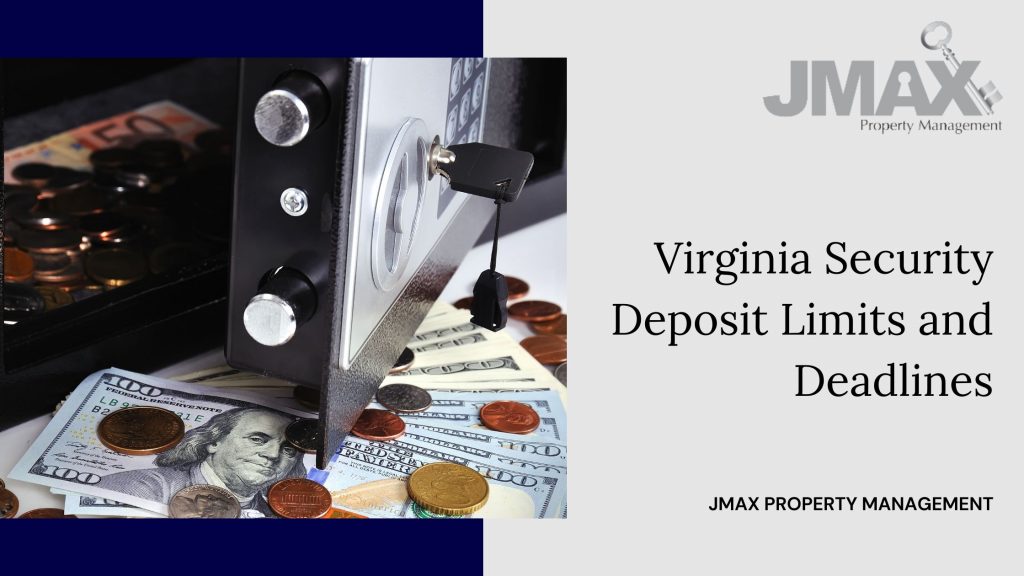
Although not required by the Virginia security deposit law, most Virginia landlords ask their tenants to pay a security deposit. Basically, the security deposit acts like a safety net against any financial ruin that can arise during the tenancy period.
For example, as a landlord, you may be able to use part or all of your tenant’s deposit in the event that they cause excessive property damage. Some examples of excessive property damage include:
- Broken cabinet doors
- Clogged or damaged toilets
- Broken windows
- Torn or missing curtains or blinds
- Stained carpeting
The Virginia security deposit law is contained in the statewide landlord-tenant law. As a landlord, you have an obligation to abide by all the provisions of Virginia landlord tenant law.
In this post, we are offering a basic overview and answering some frequently asked questions regarding the Virginia security deposit laws.
Security Deposit Maximum
Under the Virginia security deposit law, there is a limit on how much security deposit landlords can charge your Virginia tenants. The maximum a landlord can charge is the equivalent of two months’ rent.
So, if a landlord charges $1,000 as rent, it means that the most the landlord can ask as a security deposit is $2,000.
Allowable Security Deposit Deductions
As a Virginia landlord, you have a right to make deductions to a tenant’s deposit under certain circumstances.
Some of the most common circumstances include:
- Unpaid utilities
- Any damage exceeding normal wear and tear
- Loss or damage resulting from tenant negligence or abuse
- Unpaid rent

Normal Wear & Tear vs. Damage
As previously mentioned, landlords can use the tenant’s security deposit to cover for damages to your rental unit exceeding normal wear and tear.
But, what exactly is normal wear and tear? Wear and tear is the “normal” deterioration of a property. When tenants live in a property for many years, it’s normal that certain furnishings and appliances may naturally age. Wear and tear is not a result of tenant carelessness, misuse or abuse.
Some examples of normal wear and tear include:
- Worn-out carpets
- Loose door handles
- Fading paint
- Lightly scratched glass
- Dirty grout
- Naturally occurring mold
On the other hand, property damage occurs due to a tenant’s negligence or abuse. If there’s property damage, landlords may use the security deposit to cover the repair costs.
When to Return a Tenant’s Security Deposit
As a Virginia landlord, you must return your tenant’s deposit within 45 days after they move out. Landlords don’t have to give the tenant any advance notice of any deductions they have made.
Landlords must return the security deposits, less any allowable deductions, along with an itemized list of deductions. The itemized list must include any remaining deposit plus deductions for damages, including costs of repair.
If the damage a tenant has caused exceeds the deposit amount, the landlords must let the tenant know within the 45-day period. They’d then have an additional 15 days to provide the tenant with the itemized list of deductions.
Landlord Consequences for Failing to Return the Tenant’s Deposit
A tenant can sue a Virginia landlord who fails to return the security deposit. If you wrongfully withhold the tenant’s deposit, you risk paying punitive damages.
You may be required to pay:
- The entire security deposit amount back to the tenant
- The cost of damages
- Attorney fees
- Costs of suit

What Happens if the Tenant Fails to Provide a Forwarding Address?
It may so happen that your tenant fails to provide you a forwarding address. In such a case, you may be allowed to keep the tenant’s deposit for one year from end of the 45-day period.
After the one year, you’ll no longer be responsible for the tenant’s security deposit. However, the deposit will not be yours to keep. You’ll need to turn it over to the State Treasury as unclaimed property.
Bottom Line
As a landlord in Virginia, it’s a good idea to charge your tenants a security deposit. This security deposit will act as a safety net in case of any rental damage or unpaid rent, or utilities.
When it’s time to return the security fee back to your tenants, you must do so in a legal way.
If you have further questions about any aspect of Virginia landlord-tenant law, feel free to contact JMAX Property Management today.
Disclaimer: This information is for educational purposes. Laws keep changing and this post might not be up to date at the time you read it. For expert help, kindly get in touch with a qualified attorney or an experienced property management company.


